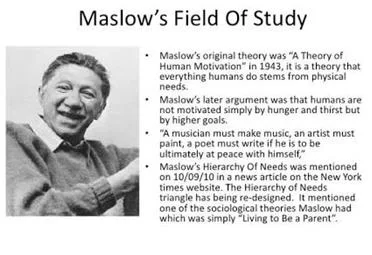
Abraham Maslow was a famous behaviouralist and psychologist in administrative thought. He propounded the theory of motivation that is known as ‘NEED – HIERARCHY’ theory among various motivational theories. It is also known as ‘SATISFACTION-NEEDS’ theory.
Maslow has classified needs into following five categories namely:-
1. Physiological needs
2. Safety needs
3. Social needs
4. Esteem needs
5. Self Actualization needs
The first order needs i.e. Physiological needs is related to the fulfillment of hunger, thirst, clothing and other physical needs. These needs must be fulfilled in order to survive.
The second order needs i.e. Safety needs are need to be completed after the above needs, The person requires safe and secure environment to live. It is known as man’s self preservation.
The third category of needs theory is called social needs that depend on the society in which the human being lives. What are his aspirations and expectations from the society is to be considered in this regard.
After the third category there comes the fourth one which is known as Esteem needs. It includes self-respect, self- recognition, dignity and social status. It is also called the higher order needs because it is related to personality development.
Finally the last category of this theory is self actualization needs. It deals with individual self potential and self realization after completing the above four types of needs. It means to become what one actually wants to become. It is also termed as Growth need.

CRITICISM:-
Apart from such detailed description this theory is not left behind from criticism.
As Lawler and Porter says that this theory need not confirm the correct hierarchy of human needs.
Some scholars state that this theory is quite interesting rather than true.
The concept of self-actualization appears to be more vague, inadequate and irrelevant in the modern context.
∆This theory is too impractical from managerial point of view to solve production related problems.
Despite of all the above criticisms this theory is the heart of content motivational theories in the study of administrative behaviour of individuals and their psychology influencing an organization pursuing towards some defined objectives.



